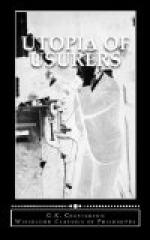But the rather spinsterish flutter among some of the old Freethinkers has put one tiny ripple of truth in it; and that affects the idea which I wish to emphasise even to monotony in these pages. I mean the idea that the new community which the capitalists are now constructing will be a very complete and absolute community; and one which will tolerate nothing really independent of itself. Now, it is true that any positive creed, true or false, would tend to be independent of itself. It might be Roman Catholicism or Mahomedanism or Materialism; but, if strongly held, it would be a thorn in the side of the Servile State. The Moslem thinks all men immortal: the Materialist thinks all men mortal. But the Moslem does not think the rich Sinbad will live forever; but the poor Sinbad will die on his deathbed. The Materialist does not think that Mr. Haeckel will go to heaven, while all the peasants will go to pot, like their chickens. In every serious doctrine of the destiny of men, there is some trace of the doctrine of the equality of men. But the capitalist really depends on some religion of inequality. The capitalist must somehow distinguish himself from human kind; he must be obviously above it—or he would be obviously below it. Take even the least attractive and popular side of the larger religions to-day; take the mere vetoes imposed by Islam on Atheism or Catholicism. The Moslem veto upon intoxicants cuts across all classes. But it is absolutely necessary for the capitalist (who presides at a Licensing Committee, and also at a large dinner), it is absolutely necessary for him, to make a distinction between gin and champagne. The Atheist veto upon all miracles cuts across all classes. But it is absolutely necessary for the capitalist to make a distinction between his wife (who is an aristocrat and consults crystal gazers and star gazers in the West End), and vulgar miracles claimed by gipsies or travelling showmen. The Catholic veto upon usury, as defined in dogmatic councils, cuts across all classes. But it is absolutely necessary to the capitalist to distinguish more delicately between two kinds of usury; the kind he finds useful and the kind he does not find useful. The religion of the Servile State must have no dogmas or definitions. It cannot afford to have any definitions. For definitions are very dreadful things: they do the two things that most men, especially comfortable men, cannot endure. They fight; and they fight fair.
Every religion, apart from open devil worship, must appeal to a virtue or the pretence of a virtue. But a virtue, generally speaking, does some good to everybody. It is therefore necessary to distinguish among the people it was meant to benefit those whom it does benefit. Modern broad-mindedness benefits the rich; and benefits nobody else. It was meant to benefit the rich; and meant to benefit nobody else. And if you think this unwarranted, I will put before you one plain question. There are some pleasures of the poor that may also mean profits for the rich: there are other pleasures of the poor which cannot mean profits for the rich? Watch this one contrast, and you will watch the whole creation of a careful slavery.




